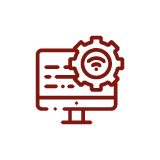In: Data & AI
In this course, students will gain foundational knowledge of core data concepts and related Microsoft Azure data services. Students will learn about core data concepts such as relational, non-relational, big data, and analytics, and build their foundational knowledge of cloud data services within Microsoft Azure. Students will explore fundamental relational data concepts and relational database services in Azure. They will explore Azure storage for non-relational data and the fundamentals of Azure Cosmos DB. Students will learn about modern data warehousing, real-time analytics, and data visualization.
Audience Profile
The audience for this course is individuals who want to learn the fundamentals of database concepts in a cloud environment, get basic skilling in cloud data services, and build their foundational knowledge of cloud data services within Microsoft Azure.
Course outline
Module 1: Explore core data concepts
Students will learn about core data concepts such as relational, non-relational, big data, and analytics, and build their foundational knowledge of cloud data services within Microsoft Azure.
Lessons
Core data concepts
-
Data roles and Services
After completing this module, students will be able to:
-
Identify how data is defined and stored
-
Identify characteristics of relational and non-relational data
-
Describe and differentiate data workloads
-
Describe and differentiate batch and streaming data
-
Identify common data professional roles
-
Identify common c...
Module 1: Explore core data concepts
Students will learn about core data concepts such as relational, non-relational, big data, and analytics, and build their foundational knowledge of cloud data services within Microsoft Azure.
Lessons
Core data concepts
-
Data roles and Services
After completing this module, students will be able to:
-
Identify how data is defined and stored
-
Identify characteristics of relational and non-relational data
-
Describe and differentiate data workloads
-
Describe and differentiate batch and streaming data
-
Identify common data professional roles
-
Identify common cloud services used by data professionals
Module 2: Explore fundamentals of relational data in Azure
Students will explore fundamental relational data concepts and relational database services in Azure.
Lessons
Explore relational data offerings in Azure
-
Explore Azure services for relational data
Lab : Provision Azure relational database services
After completing this module, students will be able to:
-
Identify characteristics of relational data
-
Define normalization
-
Identify types of SQL statement
-
Identify common relational database objects
-
Identify options for Azure SQL services
-
Identify options for open-source databases in Azure
-
Provision a database service on Azure
Module 3: Explore fundamentals of non-relational data in Azure
Students will explore Azure storage for non-relational data and the fundamentals of Azure Cosmos DB.
Lessons
Fundamentals of Azure Storage
-
Fundamentals of Azure Cosmos DB
Lab : Explore Azure Storage
Lab : Explore Azure Cosmos DB
After completing this module, students will be able to:
-
Describe features and capabilities of Azure blob storage
-
Describe features and capabilities of Azure Data Lake Gen2
-
Describe features and capabilities of Azure file storage
-
Describe features and capabilities of Azure table storage
-
Provision and use an Azure Storage account
-
Describe key features and capabilities of Azure Cosmos DB
-
Identify the APIs supported in Azure Cosmos DB
-
Provision and use an Azure Cosmos DB instance
Module 4: Explore fundamentals of data analytics
Students will learn about modern data warehousing, real-time analytics, and data visualization.
Lessons
Modern data warehousing
-
Streaming and real-time analytics
-
Data visualization
Lab : Analyze streaming data
Lab : Visualize data with Power BI
Lab : Explore Azure Synapse Analytics
After completing this module, students will be able to:
-
Identify common elements of a modern data warehousing solution
-
Describe key features for data ingestion pipelines
-
Identify common types of analytical data store and related Azure services
-
Provision Azure Synapse Analytics and use it to ingest, process, and query data
-
Compare batch and stream processing
-
Describe common elements of streaming data solutions
-
Describe features and capabilities of Azure Stream Analytics
-
Describe features and capabilities of Spark Structured Streaming on Azure
-
Describe features and capabilities of Azure Synapse Data Explorer
-
Describe a high-level process for creating reporting solutions with Microsoft Power BI
-
Describe core principles of analytical data modeling
-
Identify common types of data visualization and their uses
-
Create an interactive report with Power BI Desktop
Show more
Durata
- 7 ore
Prerequisiti
Prerequisite certification is not required before taking this course. Successful Azure Data Fundamentals students start with some basic awareness of computing and Internet concepts, and an interest in extracting insights from data.
Specifically:
- Experience using a web browser, such as Microsoft Edge.
- Familiarity with basic data-related concepts, such as working with tables of data in a spreads...
Prerequisite certification is not required before taking this course. Successful Azure Data Fundamentals students start with some basic awareness of computing and Internet concepts, and an interest in extracting insights from data.
Specifically:
- Experience using a web browser, such as Microsoft Edge.
- Familiarity with basic data-related concepts, such as working with tables of data in a spreadsheet and visualizing data using charts.
- A willingness to learn through hands-on exploration.
Show more
Durata: 7 ore
Solo su richiesta
Questo corso è erogabile solo su richiesta, in modalità on-line (con formazione a distanza), oppure on-site, sempre personalizzati secondo le esigenze.
















